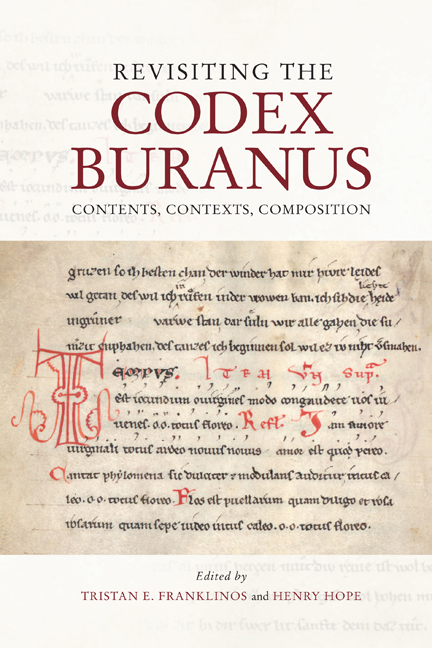Book contents
- Frontmatter
- Contents
- List of Illustrations
- Acknowledgements
- Abbreviations
- Dedication
- Introduction: The Codex Buranus – A Unique Challenge
- Chapter 1 A Modern Reception History of the Codex Buranus in Image and Sound
- Chapter 2 Parody in the Codex Buranus
- Chapter 3 Satire in the Codex Buranus
- Chapter 4 ‘Artes Amatorie Iam Non Instruuntur’: Learned and Erotic Discourse in the Carmina Burana
- Chapter 5 Classical Learning and Audience in the Carmina Amatoria: A Case-Study on CB 92
- Chapter 6 Rape, the Pastourelle, and the Female Voice in CB 185
- Chapter 7 Rethinking the Carmina Burana III: The Poetry of Peasants
- Chapter 8 Predestination and God’s Grace: The Salvific Architecture of the Religious Songs in the Codex Buranus
- Chapter 9 Revisiting the Plays of the Codex Buranus
- Chapter 10 Revisiting the Music of the Codex Buranus
- Chapter 11 Locating the Codex Buranus: Notational Contexts
- Chapter 12 Plurilingualism in the Codex Buranus: An Intercultural Reconsideration
- Chapter 13 Compilation, Contrafacture, Composition: Revisiting the German Texts of the Codex Buranus
- Afterword: multiformis armonia, scolaris symphonia
- List of Manuscripts
- Bibliography
- Index
- General Index
- Studies in Medieval and Renaissance Music
Chapter 13 - Compilation, Contrafacture, Composition: Revisiting the German Texts of the Codex Buranus
Published online by Cambridge University Press: 16 September 2020
- Frontmatter
- Contents
- List of Illustrations
- Acknowledgements
- Abbreviations
- Dedication
- Introduction: The Codex Buranus – A Unique Challenge
- Chapter 1 A Modern Reception History of the Codex Buranus in Image and Sound
- Chapter 2 Parody in the Codex Buranus
- Chapter 3 Satire in the Codex Buranus
- Chapter 4 ‘Artes Amatorie Iam Non Instruuntur’: Learned and Erotic Discourse in the Carmina Burana
- Chapter 5 Classical Learning and Audience in the Carmina Amatoria: A Case-Study on CB 92
- Chapter 6 Rape, the Pastourelle, and the Female Voice in CB 185
- Chapter 7 Rethinking the Carmina Burana III: The Poetry of Peasants
- Chapter 8 Predestination and God’s Grace: The Salvific Architecture of the Religious Songs in the Codex Buranus
- Chapter 9 Revisiting the Plays of the Codex Buranus
- Chapter 10 Revisiting the Music of the Codex Buranus
- Chapter 11 Locating the Codex Buranus: Notational Contexts
- Chapter 12 Plurilingualism in the Codex Buranus: An Intercultural Reconsideration
- Chapter 13 Compilation, Contrafacture, Composition: Revisiting the German Texts of the Codex Buranus
- Afterword: multiformis armonia, scolaris symphonia
- List of Manuscripts
- Bibliography
- Index
- General Index
- Studies in Medieval and Renaissance Music
Summary
The German-texted items of the Codex Buranus have given rise to much critical debate and – not least – an inordinate amount of speculation. Cyril Edwards aptly summarises their preeminent role in the manuscript's scholarly reception by characterising the German lyrics as ‘the best-known, but also the most contentious texts in the manuscript’. Scholarship in the twenty-first century, however, has tended to circumnavigate the issues surrounding these texts in favour of other concerns. Johann Drumbl's reconsideration of the manuscript's provenance offers explicit discussion of its German texts only in passing, despite making the tantalising suggestion that the manuscript may have originated in the context of Emperor Frederick II's retinue. Drumbl's relative disregard for the German texts as a distinct category is representative of a shift in perspective in approaching the manuscript as a whole, as evidenced in the recent work of Gundela Bobeth, who attempts to liberate the collection once and for all from its long-standing association with a construed notion of vagrant poetry and the concomitant assumptions about its defective, impoverished transmission. With a view to the notational features of the Latin song Dic Christi ueritas (CB 131), Bobeth demonstrates the ways in which the compilers of the Codex Buranus created a meaningful version of this compositum by uniting two distinct songs into one. Like Drumbl, Bobeth makes only passing reference to the German texts (in relation to their notation) and does not dwell on the issue that had excited and puzzled earlier scholars, namely that German (and other non-Latin) texts were included in this predominantly Latin manuscript to such a large extent.
As its absence from recent publications suggests, the debate over how and why German materials made their way into the collection of the Codex Buranus seems to have reached an academic impasse. In 1992, Olive Sayce presented a comprehensive study of this corpus and one might reasonably have predicted that her 200-page analysis, which considers the manuscript's plurilingual features across languages from a variety of perspectives – scribal, linguistic, literary, and formal – would have provided a satisfactory resolution to the debates surrounding this corpus.
- Type
- Chapter
- Information
- Revisiting the Codex BuranusContents, Contexts, Compositions, pp. 351 - 392Publisher: Boydell & BrewerPrint publication year: 2020



